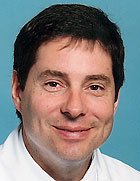Ensuring that the elderly have access to transportation while preventing age-related driving impairments will be the focus of the eighth annual Friedman Conference on Aging, “Are We Licensed for Life? Transportation and Driving Issues in an Aging Society.”
The conference, sponsored by the Harvey A. Friedman Center for Aging, will be held Tuesday, May 13, at the Eric P. Newman Education Center at the School of Medicine. The conference is free and open to the public and includes lunch but requires preregistration, which is available online at wucfa.wustl.edu/Friedman/2008/Friedman2008Register.asp. The conference is funded by the Barnes-Jewish Hospital Foundation.

The surge of baby boomers now entering their 60s means more drivers on the road could one day be impaired by dementia or other cognitive or physical impairments linked to aging, said David Carr, M.D., associate professor of medicine and of neurology and a conference speaker.
“Society has an obligation to maintain the safety of elderly drivers and those they share the road with,” said Carr, clinical director of Geriatrics and Nutritional Science. “But when we take away the right to drive or it is voluntarily surrendered, we also have an obligation to find ways to give those seniors access to the mobility they need to continue to live happy and productive lives.”
The keynote speaker for this year’s conference will be Katherine Freund, president and executive director of the Independent Transportation Network of America. The organization supports the creation of nonprofit, community-based networks that provide transportation services to seniors no longer able to drive, enabling them to stay in touch with family and friends and continue to be active members of their community.
Other speakers and their topics include:
• Richard Marottoli, M.D., medical director of the Dorothy Adler Geriatric Assessment Center at Yale-New Haven Hospital in Connecticut, will speak on ways to improve driving skills in older adults;
• Brian Ott, M.D., director of the Alzheimer’s Disease & Memory Disorders Center at Rhode Island Hospital, will discuss the challenges of evaluating driving skills in the elderly;
• Loren Staplin, Ph.D., managing partner at Transanalytics LLC, will discuss the availability and validation of new tools to detect functional decline that elevates crash risk for older drivers;
• Linda Hunt, Ph.D., of the School of Occupational Therapy at Pacific University in Hillsboro, Ore., will share Oregonians’ experiences with a law requiring physicians to report potential for impaired driving in their patients to the state Department of Motor Vehicles;
• Thomas Meuser, Ph.D., director of gerontology at the University of Missouri-St. Louis, will describe the state of Missouri’s efforts to identify drivers impaired by age-related conditions;
• Jacqueline Rogers, system management specialist with the Division of Highway Safety of the Missouri Department of Transportation, will speak on the state of Missouri’s transportation programs and policies for older adults.
Chancellor Mark S. Wrighton; Larry J. Shapiro, M.D., executive vice chancellor for medical affairs and dean of the School of Medicine; and John C. Morris, M.D., the Harvey A. and Dorismae Hacker Friedman Professor of Neurology and director of the Friedman Center for Aging, will each make brief remarks.